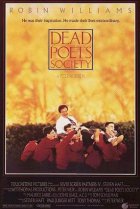
Dead Poets Society
- PG
- Year:
- 1989
- 128 min
- 2,222 Views
INT WELTON ACADAMY DINING HALL - DAY - VARIOUS SHOTS 1
CREDITS ROLL:
On the left is a life-sized mural depicting a group of young
school boys looking up adoringly at a woman who represents
liberty. On the right is a mural showing young men gathered
around an industrialist in a corporate boardroom. Between the
murals stands a boy.
An odd, blaring MUSICAL SOUND starts and stops, interrupted
by the noise of pumping. A teacher hurries to the boy,
adjusts his tie, and leads him off.
On another wall is a full-sized portrait of a 19th century
Scotsman in a kilt. In front at this, young boys carrying
banners, and several elderly men in old-fashioned costumes
assembling into a processional formation. Nervous younger
boys (7th graders) are shown their places in line and handed
candles. They light each others.' candles until all their
candles are lit.
Suddenly the MUSIC BLASTS FORTH in its full splendor. It is
a BAGPIPE. The bagpiper, in a kilt like the one in the
portrait, begins a processional march.
2 INT CORRIDOR ADJACENT THE DINING ROOM - SAME 2
The bagpiper enters a long slate and stone hallway. The
haunting timbre of his antiquated instrument reverberates
through the building. Momentarily, he is followed by the
other processional marchers. He leads them down the corridor
and down a threshold staircase into:
3 INT. WELTON'S OLD, STONE CHAPEL - CONTINUOUS 3
Where two hundred high school-aged boys--most of whom wear
black blazers--sit on either side of the central aisle
watching the procession move onto the dais in front. Beside
most of these boys are their parents.
VARIOUS ANGLES ON THE PROCESSION
FOUR 16-YEAR-OLD Boys CARRY BANNERS.
Each boy is dressed in an archaic, turn-of-the-century
outfit. On each banner is emblazoned a different word. One
reads "TRADITION," another reads "HONOR",' a third reads
DISCIPLINE, the last reads 'EXCELLENCE."
THE ELDERLY MEN:
in their 70s and SOS, obviously the school's oldest alumni,
each wearing a name tag and the uniform of his day, make their
way toward the stage.
THE SEVENTH GRADERS
carrying candles are nervous and self-conscious. Most
concentrate intently on keeping their candles lit while they
march. One young boy's candle has gone cut and he can barely
keep from crying.
The bagpiper stands at the corner of the dais, marching in
place. Behind him, in black robes, sit the school's 30-odd
teachers. The processional's elderly alumni fill the chairs
of honor on the dais.
The four young BANNER CARRIERS peel off from the main aisle
and take seats beside their parents in the audience. The 7th
graders take seats with their parents too. A purple and black
robed man who brings up the rear of the procession walks up to
the podium. Me is HEADMASTER GALE NOLAN, a big man, in his
mid-60s. The music stops.
NOLAN:
Ladies and gentlemen, distinguished
alumni, and students: This year marks
the one hundredth year that Welton
Academy has been in existence.
Applause begins. Soon the whole room is standing in a
thunderous ovation. After an appropriate amount of time,
Nolan motions for everyone to be seated.
NOLAN (CONT'D)
One hundred years ago, in 1859, forty-one boys sat in this
room and were asked the same question that now greets you at
the start of each semester: Gentlemen, what are the four
pillars?
All of the students stand at attention. Find TODD ANDERSON
sitting between his parents. Todd is 16, good looking, but he
seems beaten down, lacking confidence, unhappy. He wears a
name tag and no Welton blazer. When the others stand, Todd's
mother nudges him. Todd stands. He watches as the other
students:
ALL THE BOYS IN UNISON
Tradition! Honor! Discipline!
Excellence!
All the boys sit. Todd sits too. All is silent again.
NOLAN:
In her first year, Welton Academy
graduated five students. Last year we
graduated fifty-one and over seventy-five
percent of those went to the Ivy League!
Applause. During it we rind KNOX OVERSTREET and CHARLIE
DALTON, both 16, and both in Welton blazers. Knox (sitting
between his parents) carries a banner. He has curly hair,
looks outgoing, is short but well built. Charlie, also with
his parents, has a handsome yet friendly face. He carries no
banner but, when Nolan mentions Ivy League, both these boys
fit the bill.
NOLAN (CONT'D)
This kind of accomplishment is the
result of fervent dedication to the
principles taught here. This is why you
parents have been sending us your sons,
and this is why we are the best
preparatory school in the United States.
(more applause)
New students
All turn to look at the new students the 7th graders and
transfer students. Todd Anderson is among them and he looks
incredibly self-conscious.
NOLAN (CONT'D)
The key to your success rests on our
four pillars. These are the bywords of
this school and they will become the
cornerstones of your lives. Welton
Society candidate Richard Cameron...
In the audience, not far from Todd is Richard CAMERON, one of
the banner carriers, 16, his father's little clone. He stands
eagerly to attention. Too eagerly.
CAMERON:
Yes sir!
NOLAN:
What is Tradition?
CAMERON:
Tradition, Mr. Nolan, is love of school,
country, and family. Our tradition at
Welton is to be the best!
NOLAN:
Good, Mr. Cameron. Welton Society
Candidate George Hopkins. Honor.
Cameron sits. His father beams smugly.
HOPKINS (O.S.)
Honor is dignity and the fulfillment of
duty!
NOLAN:
Good, Mr. Hopkins. Honor Society
Candidate, Knox Overstress
Knox, as mentioned, is a banner-holder. He stands.
KNOX:
Yes sir.
NOLAN:
What is discipline?
KNOX:
Discipline is respect for parents,
teachers, headmaster. Discipline comes
from within.
NOLAN:
Thank you, Mr. Overstress. Honor
Candidate Neil Perry.
Knox sits. Knox's proud father and mother give him pats of
encouragement. NEIL PERRY stands. Whereas some boys have two
or three achievement pins an the lapels of their coats, Neil
has a huge cluster of them on the pocket of his jacket. Neil
is 16, intense, a born leader. However, there is more than a
hint of anger and dissatisfaction in his eyes. Beside him
sits his unsmiling father, MR. PERRY.
Translation
Translate and read this script in other languages:
Select another language:
- - Select -
- 简体中文 (Chinese - Simplified)
- 繁體中文 (Chinese - Traditional)
- Español (Spanish)
- Esperanto (Esperanto)
- 日本語 (Japanese)
- Português (Portuguese)
- Deutsch (German)
- العربية (Arabic)
- Français (French)
- Русский (Russian)
- ಕನ್ನಡ (Kannada)
- 한국어 (Korean)
- עברית (Hebrew)
- Gaeilge (Irish)
- Українська (Ukrainian)
- اردو (Urdu)
- Magyar (Hungarian)
- मानक हिन्दी (Hindi)
- Indonesia (Indonesian)
- Italiano (Italian)
- தமிழ் (Tamil)
- Türkçe (Turkish)
- తెలుగు (Telugu)
- ภาษาไทย (Thai)
- Tiếng Việt (Vietnamese)
- Čeština (Czech)
- Polski (Polish)
- Bahasa Indonesia (Indonesian)
- Românește (Romanian)
- Nederlands (Dutch)
- Ελληνικά (Greek)
- Latinum (Latin)
- Svenska (Swedish)
- Dansk (Danish)
- Suomi (Finnish)
- فارسی (Persian)
- ייִדיש (Yiddish)
- հայերեն (Armenian)
- Norsk (Norwegian)
- English (English)
Citation
Use the citation below to add this screenplay to your bibliography:
Style:MLAChicagoAPA
"Dead Poets Society" Scripts.com. STANDS4 LLC, 2025. Web. 18 Jan. 2025. <https://www.scripts.com/script/dead_poets_society_844>.



Discuss this script with the community:
Report Comment
We're doing our best to make sure our content is useful, accurate and safe.
If by any chance you spot an inappropriate comment while navigating through our website please use this form to let us know, and we'll take care of it shortly.
Attachment
You need to be logged in to favorite.
Log In